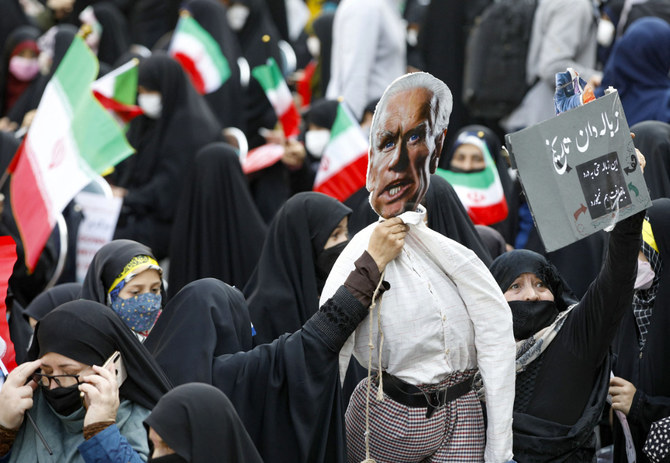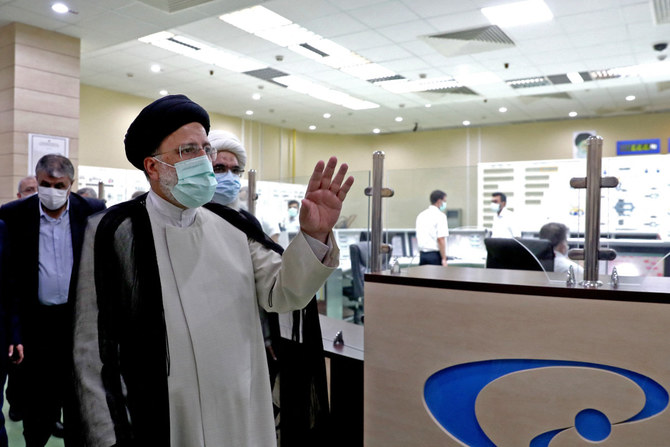WASHINGTON: Talks to revive the Iran nuclear deal, which could see stringent sanctions on Tehran lifted in exchange for guarantees to halt its uranium enrichment program, resumed in Vienna at the end of last month.
However, delays and obstructions by the hard-line government of Iran’s President Ebrahim Raisi, Israeli attacks on Iranian targets in Syria, and increasingly combative rhetoric from Tel Aviv have collectively cast doubt on the success of the renewed dialogue.
Jean-Yves Le Drian, the French foreign minister, told a parliamentary committee on Dec. 7 that he fears the Iranians are playing for time in an attempt to water down the terms of the deal.
“We have the feeling the Iranians want to make it last and the longer the talks last, the more they go back on their commitments and get closer to capacity to get a nuclear weapon,” Le Drian was quoted by the Reuters news agency as saying.

Soon after the talks resumed, the head of Israel’s intelligence agency Mossad, David Barnea, vowed that Israel will never allow Iran to acquire nuclear weapons, indicating that the Naftali Bennett government is losing patience with diplomatic efforts and is increasingly willing to use force.
Indeed, on Dec. 7, Israel launched a rare airstrike against Syria’s main port of Latakia. According to the Syrian Observatory for Human Rights, a UK-based conflict monitor, the strike destroyed an Iranian weapons shipment. Israel’s military is yet to comment on the attack.
“Iran will not have nuclear weapons — not in the coming years, not ever,” Barnea said at an agency awards ceremony in early December. “This is my personal commitment: This is the Mossad’s commitment.”
“Our eyes are open, we are alert, and together with our colleagues in the defense establishment, we will do whatever it takes to keep that threat away from the state of Israel and to thwart it in every way.”
Barnea and Benny Gantz, Israel’s defense minister, made a rare joint trip to Washington last week where they reportedly pressed senior White House officials on the need to seriously consider joint strikes on key Iranian military and nuclear targets.
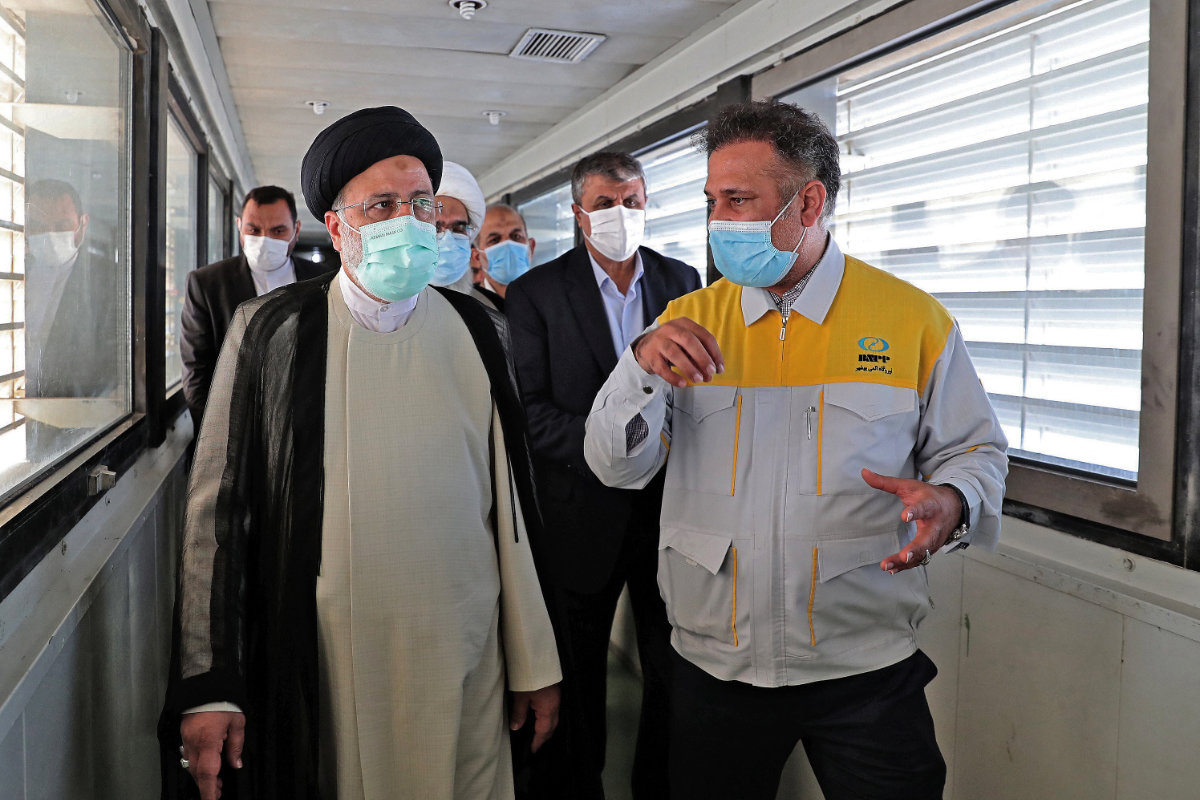
A handout picture provided by the Iranian presidency on Oct. 8, 2021 shows Iran's President Ebrahim Raisi visiting the Bushehr Nuclear Power Plant. (AFP)
Iran has accelerated enrichment since the US withdrew from the accord in 2018, with then-president Donald Trump claiming the deal did not go far enough in curtailing Tehran’s atomic ambitions. Iran has long insisted its program is purely for civilian energy purposes.
US President Joe Biden, who helped negotiate the original deal in 2015 as Barack Obama’s vice president, wants to rejoin a strengthened nuclear agreement, which co-signatories Russia, China, Britain, France, Germany and the EU have fought hard to salvage.
However, Israel is not convinced that reviving the 2015 deal will curb Iran’s nuclear capabilities and its ballistic missile program, to say nothing of its destabilizing influence across the Middle East. Instead, the Israelis want a more forceful deterrent on the table.
The window for reaching a nonmilitary resolution to Iran’s nuclear program is closing fast. Israeli intelligence indicates Iranian nuclear scientists are preparing to enrich uranium to 90 percent purity, bringing Tehran closer than ever to building a bomb.
Unless further enrichment is prevented, Iran could stockpile enough weapons-grade uranium in the coming months to produce a viable nuclear weapon with little warning.
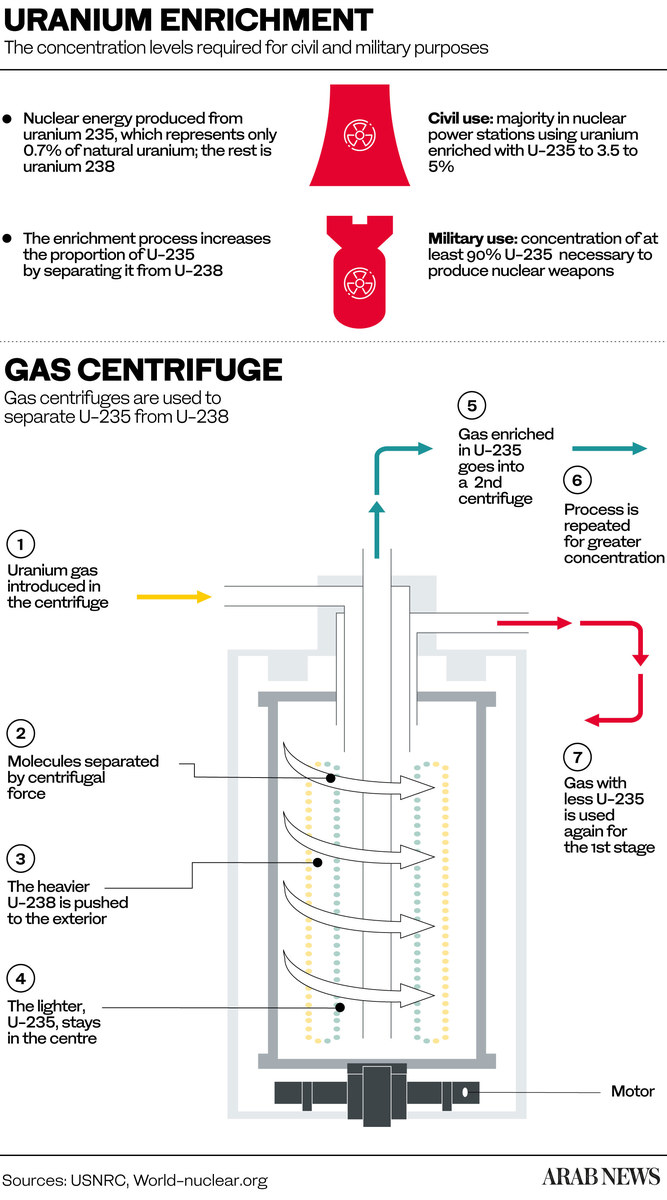
Israel’s frustration with the Biden administration’s stance has been steadily building in recent weeks. In a video published on his YouTube channel, Naftali Bennett called on fellow world leaders to not allow Iran to get away with what he called “nuclear blackmail.”
Israeli officials are concerned Biden’s negotiating team will roll back sanctions on Iran, both nuclear and terrorism-related, thereby releasing billions of dollars that the regime desperately needs, in exchange for only minimal guarantees on curtailing its nuclear program.
Furthermore, Bennett has hinted that Israel is prepared to take matters into its own hands if the US accepts a “less for less” interim deal with Iran that would potentially give the regime sufficient latitude to achieve nuclear weapons breakout in the near future.
Such an incremental deal could end up further emboldening Iran’s regional transnational terror network by providing Shiite proxies in Iraq, Lebanon, Syria, Yemen and beyond with funding previously denied to them under harsh sanctions.
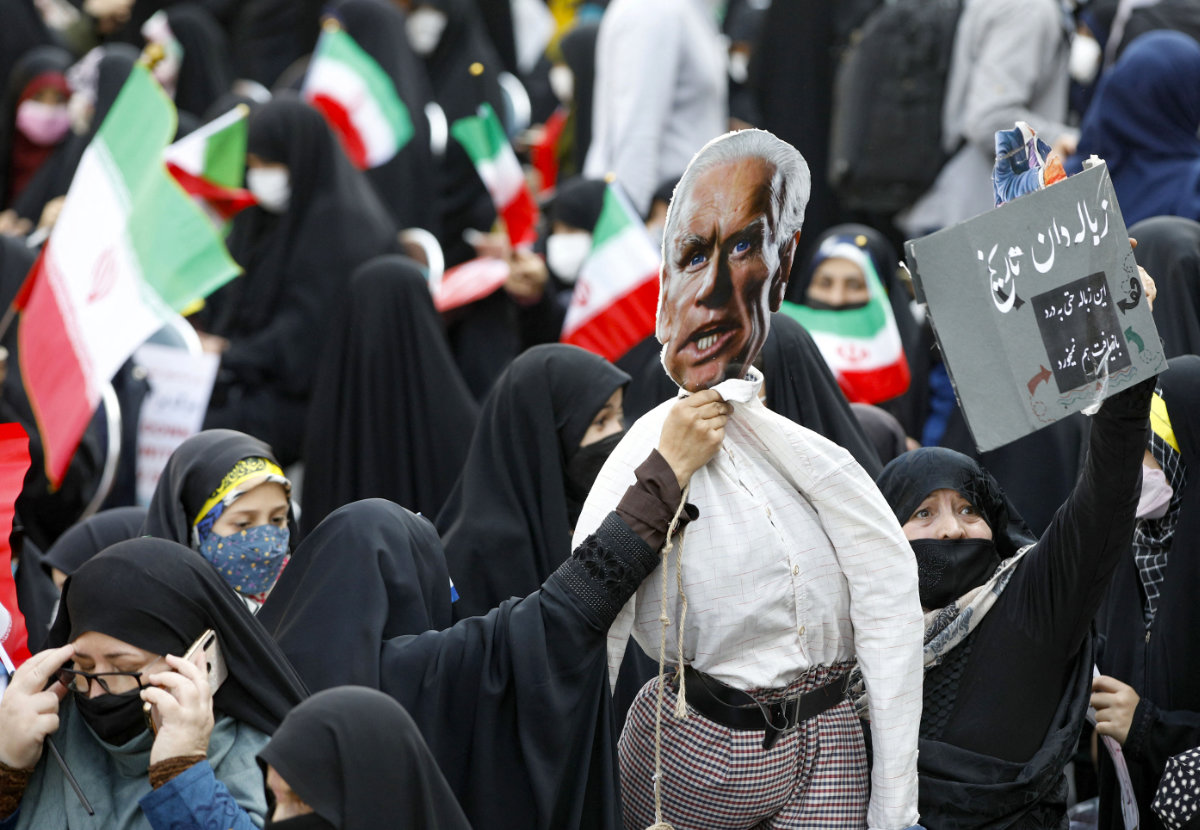
Iranian protesters raise a dummy of US President Joe Biden during a rally outside the former US embassy in Tehran on Nov. 4, 2021, to mark the 42nd anniversary of the start of the Iran hostage crisis. (AFP photo)
“To chase the terrorist du jour sent by the Quds Force does not pay off anymore,” Bennet said in a televised conference hosted by Reichman University on Nov. 23. “We must go for the dispatcher.”
The US and Israel have traditionally acted in lockstep on the issue of containing Iran, so the recent divergence of opinion and the growing prospect of unilateral Israeli action is raising concerns in Washington.
“Naftali Bennett’s government tried hard to cooperate with the Biden team when they came into office to present a joint front on Iran policy because they genuinely thought it could get the US to listen to them more,” said Gabriel Noronha, executive director of the Forum for American Leadership and previously the State Department’s special adviser for Secretary of State Mike Pompeo’s Iran Action Group.
“They’ve increasingly realized they were naive on this point and have begun speaking out in the press more and more with their complaints, while at the same time US officials are leaking details of Israeli military operations to the press.
“Both Israeli officials and the US military leadership believe there is a need to have a credible military threat to deter Iran’s nuclear program. However, they are at odds with Biden’s political appointees at the State Department, National Security Council, and Colin Kahl — the number three official at the Pentagon — who remain under the delusion that appeasement toward Iran is the best path forward.”

International Atomic Energy Agency inspectors visit the Natanz nuclear research center in Isfahan Province, Iran, Jan. 20, 2014. (AFP file photo)
Noronha warned against downplaying Israel’s complaints in the quest to revive the nuclear deal, arguing that taking the country’s security concerns seriously might actually enhance US leverage over Iran.
“The US needs to change its approach and recognize that Israel is its best partner against the Iranian threat because its military, diplomatic and economic pressure against the regime gives the US more leverage in negotiations,” he told Arab News.
“Many Israeli officials are incredibly frustrated by Washington’s antagonism toward Israeli policy, which is just trying to ensure its basic security needs are met. Israel can help the US — and its negotiations — by continuing to take covert action against Iran’s oil exports and its nuclear program.
“The US would be wise to share more intelligence with Israel to advance and support its operations, as well as accelerate its military cooperation on a potential airstrike against Iran’s nuclear facilities.”
One area in which the Biden administration sharply differs from Bennett’s outlook is its willingness to accept a “threshold state” when it comes to Iran’s nuclear capabilities.
Indeed, it would appear the Biden White House is prepared to tolerate a status quo in which Iran holds the components for “nuclear breakout,” including the requisite knowledge, military hardware and enrichment capacity, without actually building a nuclear weapon.
By contrast, the Israelis believe such a threshold state is just as serious as Iran actually developing a nuclear weapon.
Ellie Cohanim, who was deputy special envoy to monitor and combat antisemitism at the State Department under the Trump administration, is concerned the Biden administration is not listening to Israeli concerns.
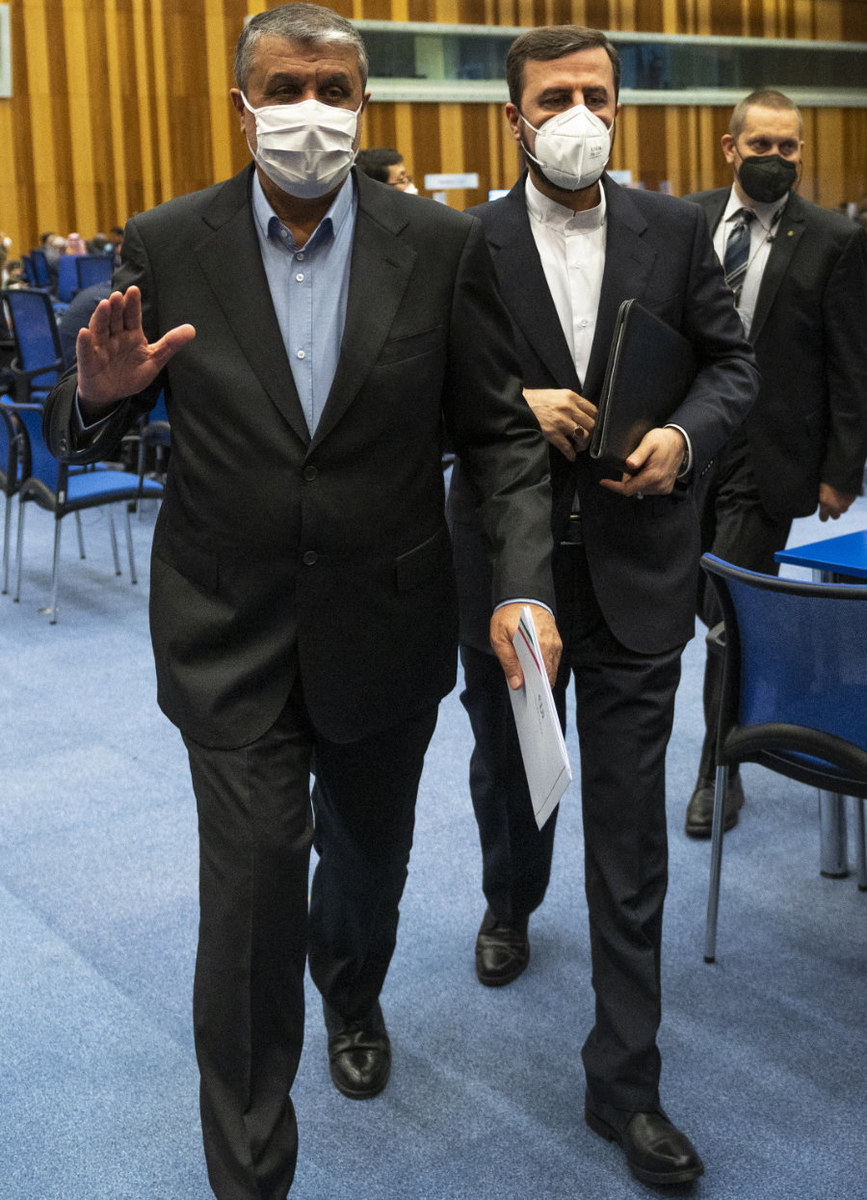
Iran atomic energy chief Mohammad Eslami (L) and Kazem Gharib Abadi (C), Iran's governor to the International Atomic Energy Agency (IAEA), depart after attending an IAEA meeting in Vienna, Austria on Sept. 20, 2021. (AFP)
“It seems that, behind the scenes, the differences between the Biden administration and its Iran negotiating team with the Israeli government are growing,” Cohanim told Arab News, adding that the Biden team has failed to replicate the Trump administration’s “zero tolerance” policy.
“Israeli PM Bennett has stated on the record that the US and world powers need to wake up to the fact that the Iranian regime is seeking nuclear weapons, and so it would appear there is a sense of frustration that the Israelis have with the current US administration,” she told Arab News.
“President Donald Trump stated clearly that he would never allow Iran to develop a nuclear bomb on his watch, and it is time for US President Joe Biden to go on the record stating the same.
“The Israelis have demonstrated time and again their premier intelligence capability, especially in relation to Iran. The Biden administration would be well advised to rely on Israeli intelligence data and take any necessary military actions to end Iran’s nuclear weapons activity should Israel ever assess that the Iranians had crossed the line when no further alternatives exist to kinetic activity.”
Where this line is drawn remains a point of contention between Biden and Bennett’s national security teams. Failure to reach a common position could result in unilateral Israeli action against Iran’s nuclear infrastructure. And, yet, the rift seems wider than ever.
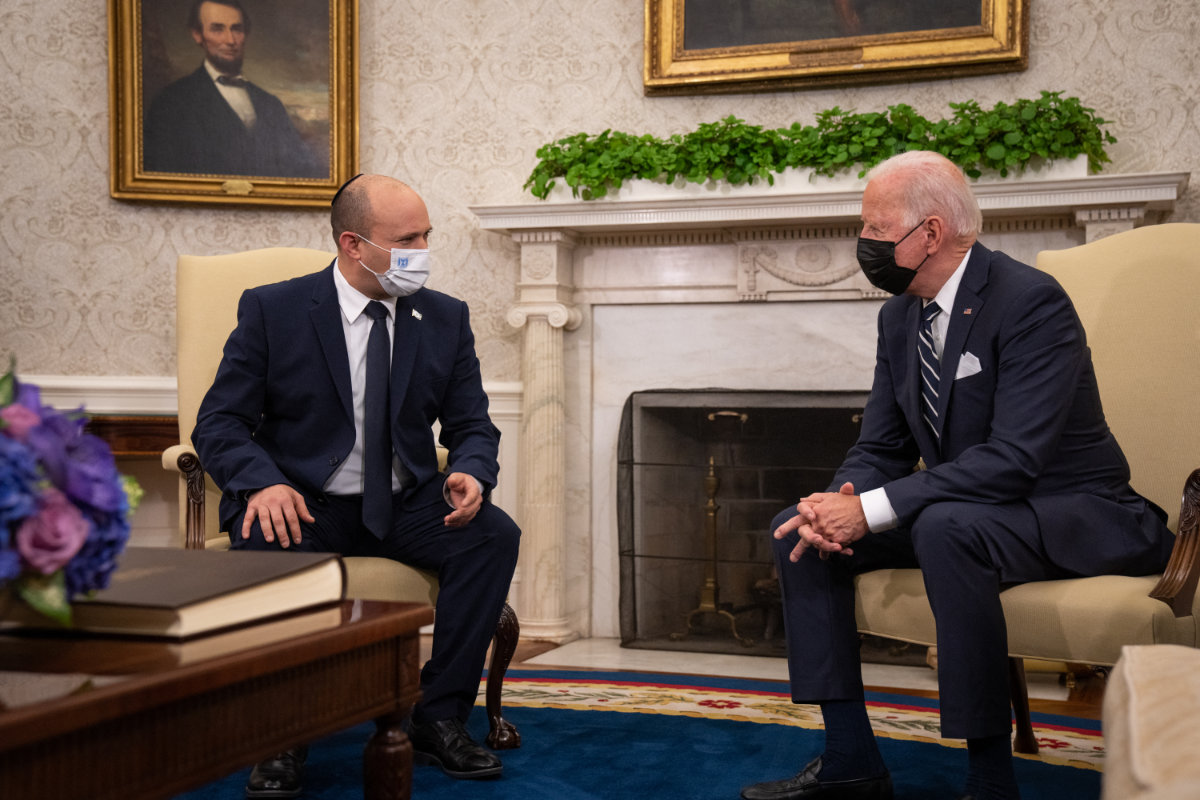
US President Joe Biden meets with Israeli Prime Minister Naftali Bennett at the White House on August 27, 2021 in Washington, DC, during talks focused on Iran. (AFP photo)
“Ever since Prime Minister Bennett’s visit to Washington to meet President Biden, senior Israeli officials have been publicly talking about their displeasure with Biden’s plan to move full steam ahead with diplomacy with the Islamic Republic,” Bryan Leib, executive director of Iranian Americans for Liberty, told Arab News.
“Just a week ago, Biden’s US special envoy to Iran was in Israel meeting with several senior Israeli officials, but it was reported that PM Bennett chose not to meet with him.
“For the last 40 years, the Iranian regime has been censoring, oppressing and murdering its own citzens, while its leaders publicly call for the destruction of the US and the world’s only Jewish nation, Israel,” Leib said.
“Diplomacy with the Islamic Republic will fail once again because they are not rational actors that truly seek peace and a brighter future for their people.”
____________
• Twitter: @OS26




